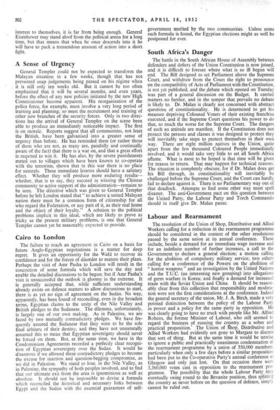Labour and Rearmament
The resolution of the Union of Shop, Distributive and Allied Workers calling for a reduction itt the rearmament programme should be considered in the context of the other resolutions passed by the same union at its annual conference. These include, beside a demand for an immediate wage increase and for an indefinite number of further increases, a call to the Government to declare a general election; a motion calling for the abolition of compulsory military service; two others calling for a conference of the Powers on the abolition of "horror weapons" and an investigation by the United Nations and the T.U.C. (an interesting new grouping) into allegations of germ warfare in Korea; and finally a demand for increased trade with the Soviet Union and China. It should be reason- ably clear from this collection that responsibility and modera- tion were not the first considerations at the conference. Indeed the general secretary of the union, Mr. J. A. Birch, made a very pointed distinction between the policy of the Labour Party in power and a policy for the same party in opposition. He was clearly going to have no truck with people like Mr. Alfred Robens, the former Minister of Labour, who still seemed to regard the business of running the country as a sober and practical proposition. The Union of Shop, Distributive and Allied Workers had evidently not gone to Margate to discuss that sort of thing. But at the same time it would be unwise to ignore a public and practically unanimous condemnation of the rearmament programme by a union of 350,000 members, particularly when only a few days before a similar proposition had been put to the Co-operative Party's annual conference at Glasgow and only just lost. On that occasion there were 3,360,000 votes cast in opposition to the rearmament pro- gramme. The possibility that the whole Labour Party may eventually swing round to the Bevanite position, thus splitting the country as never before on the question of defence, simply cannot be ruled out


































 Previous page
Previous page